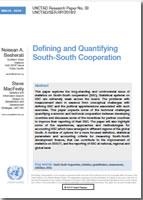
This paper explores the long-standing and controversial issue of statistics on South-South cooperation (SSC).
Statistical systems on SSC are extremely weak across the board. The problems with measurement stem in essence from conceptual challenges with defining SSC and the political apprehensions associated with such exercises.
This paper unpacks some of the technical challenges quantifying economic and technical cooperation between developing countries and discusses some of the incentives for partner countries to improve their reporting of their SSC.
The paper will also highlight some of the experiences, approaches and methodologies for accounting SSC which have emerged in different regions of the global South.
A number of options for a more focused definition, statistical parameters and accounting criteria for measuring South-South development finance, that can contribute to the improvement of statistics on SDG17, and the reporting of SSC at national, regional and global level.
To improve statistics on South-South cooperation the following scenarios are open to developing countries and partners gathering for the BAPA+40 conference (and beyond):
Option 1: | Status quo - Southern partners don't do anything. To fill the information void, OECD, Aid Data and other Northern analysts continue to produce development cooperation and development finance data also in relation to SSC. |
Option 2: | Minimum common denominators - SSC partners try to harmonize basic reporting particularly around their technical cooperation. Other regions build on the successful multilateral reporting experiences in Latin America such as SEGIB and CEPAL. |
Option 3: | New measure for SSDC - Developing countries agree on a holistic definition and clear statistical parameters for quantifying South-South Development Cooperation, including appropriate concessionality standards for South-South development finance. |


